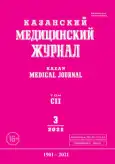Прогнозирование развития осложнений у пациентов с риносинуситом по показателям цитокинового профиля
- Авторы: Баранова Н.И.1, Ащина Л.А.1, Федин А.В.1,2, Шкурова Н.А.1,2, Сергеев С.В.1
-
Учреждения:
- Пензенский институт усовершенствования врачей — филиал Российской медицинской академии непрерывного профессионального образования
- Клиническая больница №6 им. Г.А. Захарьина
- Выпуск: Том 102, № 3 (2021)
- Страницы: 307-312
- Тип: Теоретическая и клиническая медицина
- URL: https://bakhtiniada.ru/kazanmedj/article/view/59945
- DOI: https://doi.org/10.17816/KMJ2021-307
- ID: 59945
Цитировать
Аннотация
Цель. Разработка способа прогнозирования развития осложнений у больных риносинуситом на основе изучения цитокинового профиля.
Методы. Проведено обследование 110 пациентов с риносинуситами и 30 здоровых доноров (контрольная группа). Пациенты были разделены на группу больных без осложнённого течения риносинусита (первая группа, n=65) и группу с осложнённым течением риносинусита (вторая группа, n=45). В исследуемых группах в сыворотке крови иммуноферментным методом определяли уровни интерлейкинов-1β, -4, -8, -10, -17, -18 и интерферона γ. Статистический анализ результатов осуществлён с использованием пакетов прикладных программ Microsoft Excel 2013 и Statistica 12.0. Статистические различия между сравниваемыми группами оценивали с помощью U-критерия Манна–Уитни и констатировали их значимость при р <0,05. Многофакторный анализ включал корреляционный анализ и пошаговый регрессионный анализ. Статистическую значимость математической модели устанавливали при помощи F-критерия Фишера и констатировали при р <0,05.
Результаты. Выявлены изменения в цитокиновом профиле у пациентов с неосложнённым течением риносинусита, которые выражались снижением уровня интерлейкина-1β (р=0,00001), интерлейкина-4 (р=0,045) и повышением содержания интерлейкина-18 (р=0,00001). Осложнённое течение риносинусита характеризовалось снижением уровня интерлейкина-1β (р=0,00002), интерлейкина-4 (р=0,049) и повышением количества интерлейкинов-8 (р=0,023), -17 (р=0,00015) и -18 (р=0,0002). Сравнительный анализ первой и второй групп больных показал повышенный уровень интерлейкина-8 (р=0,00001), интерлейкина-17 (р=0,0001) и сниженное содержание интерлейкина-18 (р=0,00045) в группе пациентов с осложнённым течением риносинусита. На основании показателей интерлейкинов-8, -17, и -18 разработана математическая модель прогноза развития осложнений у больных риносинуситом.
Вывод. Осложнённое течение риносинусита характеризовалось снижением уровня интерлейкинов-1β, -4 и повышением уровня интерлейкинов-8, -17, и -18, что свидетельствует о более выраженном воспалительном процессе; для персонализированной терапии разработан подход по показателям интерлейкинов-8, -17, и -18, на основании которого можно прогнозировать развитие осложнённого течения у больных риносинуситом.
Ключевые слова
Полный текст
Открыть статью на сайте журналаОб авторах
Надежда Ивановна Баранова
Пензенский институт усовершенствования врачей — филиал Российской медицинской академии непрерывного профессионального образования
Email: pushino2008@yandex.ru
Россия, г. Пенза, Россия
Людмила Андреевна Ащина
Пензенский институт усовершенствования врачей — филиал Российской медицинской академии непрерывного профессионального образования
Автор, ответственный за переписку.
Email: pushino2008@yandex.ru
Россия, г. Пенза, Россия
Андрей Викторович Федин
Пензенский институт усовершенствования врачей — филиал Российской медицинской академии непрерывного профессионального образования; Клиническая больница №6 им. Г.А. Захарьина
Email: pushino2008@yandex.ru
Россия, г. Пенза, Россия; г. Пенза, Россия
Наталья Александровна Шкурова
Пензенский институт усовершенствования врачей — филиал Российской медицинской академии непрерывного профессионального образования; Клиническая больница №6 им. Г.А. Захарьина
Email: pushino2008@yandex.ru
Россия, г. Пенза, Россия; г. Пенза, Россия
Сергей Владимирович Сергеев
Пензенский институт усовершенствования врачей — филиал Российской медицинской академии непрерывного профессионального образования
Email: pushino2008@yandex.ru
Россия, г. Пенза, Россия
Список литературы
- Волков А.Г., Стагниева И.В., Ерошенко А.Ю. Значимость локального болевого синдрома при фронтите. Вестн. оториноларингол. 2010; (4): 38–40.
- Лопатин А.С., Гамов В.П. Острый и хронический риносинусит: этиология, патогенез, клиника, диагностика и принципы лечения. М.: Первый МГМУ им. И.М. Сеченова, 2013; 91 с.
- Свистушкин В.М., Шевчик Е.А. Топическая антибактериальная терапия в практике отоларинголога. Мед. совет. 2019; (8): 10–17. doi: 10.21518/2079-701X-2019-8-10-17.
- Еремеева К.В., Будейкина Л.С. Особенности топической терапии острого среднего отита. Мед. совет. 2017; (8): 84–86. doi: 10.21518/2079-701X-2017-8-84-86.
- Крюков А.И., Кунельская Н.Л., Ивойлов А.Ю., Гаров Е.В., Гарова Е.Е., Яновский В.В. Новые тенденции в лечении острого неосложнённого среднего отита у взрослых с позиций доказательной медицины. Мед. совет. 2013; (7): 36–40. doi: 10.21518/2079-701X-2013-7-36-40.
- Байке Е.В., Уразова О.И. Цитокиновый профиль крови в зависимости от полиморфизма генов цитокинов у больных хроническим гнойным средним отитом. Бюлл. сибирской мед. 2018; 17 (1): 24–35. doi: 10.20538/1682-0363-2018-1-24-35.
- Баранова Н.И., Шкурова Н.А., Федин А.В. Особенности микробного пейзажа, активности системы фагоцитоза и профиля ключевых цитокинов у больных с риносинуситами и средними отитами на фоне сахарного диабета 2 типа. Известия высших учебных заведений. Поволжский регион. 2020; (2): 5–14. doi: 10.21685/2072-3032-2020-2-1.
- Попов Н.Н., Гарюк Г.И., Филатова И.В., Огнивенко Е.В. Клинико-иммунологическая характеристика течения хронического гнойного верхнечелюстного синусита у больных сахарным диабетом. Международн. мед. ж. 2007; (1): 103–107.
- Гуров А.В. Особенности антибактериальной терапии острого гнойного синусита и острого гнойного среднего отита. Мед. совет. 2018; (6): 78–82. doi: 10.21518/2079-701X-2018-6-78-82.
- Стагниева И.В., Симбирцев А.С. Значение цитокинового профиля в проявлении болевого симптома при риносинусите. Цитокины и воспаление. 2015; 14 (4): 29–34.
- Арефьева Н.А., Азнабаева Л.Ф., Шарипова Э.Р. IL-1β в патогенезе и лечении рецидивирующего гнойного риносинусита. Вестн. оториноларингол. 2012; (6): 51–52.
- Шкурова Н.А., Баранова Н.И. Иммунологические аспекты патогенеза риносинуситов и средних отитов у больных на фоне сахарного диабета 2 типа. Рос. иммунол. ж. 2014; 8 (3): 641–644.
- Симбирцев А.С. Цитокины в патогенезе и лечении заболеваний человека. СПб.: Фолиант. 2018; 512 с.
- Начаров П.В., Клячко Л.Л., Янов Ю.К. Цитокины в патогенезе средних отитов. Цитокины и воспаление. 2016; 15 (1): 5–11.
- Безрукова Е.В., Симбирцев А.С., Кондратьева Е.В., Калашникова О.В. Изучение роли цитокинов в носовом секрете больных различными формами риносинусита. Цитокины и воспаление. 2012; 11 (2): 63–67.
- Климов А.В., Климов В.В., Шустова В.А., Тазин И.Д. Содержание IL-8, IL-17, IL-22 и IFN-γ в назальном секрете детей с хроническим аденоидитом и рецидивирующим кариесом. Мед. иммунол. 2015; 17 (S): 315.
- Хаитов Р.М. Иммунология: структура и функции иммунной системы. Учебное пособие. М.: ГЭОТАР-Медиа. 2013; 280 с.
- Федин А.В., Баранова Н.И. Показатели ключевых цитокинов у больных острым бактериальным риносинуситом. Международн. науч.-исслед. ж. 2013; (7-5): 78–79.
Дополнительные файлы






